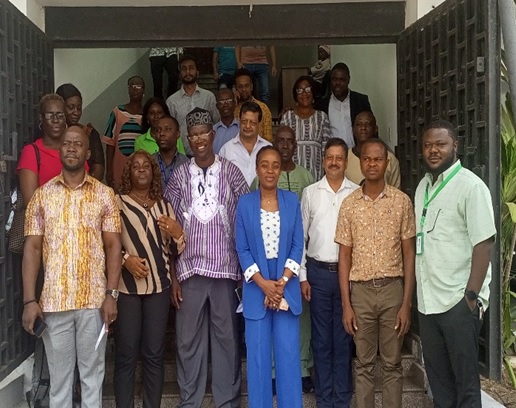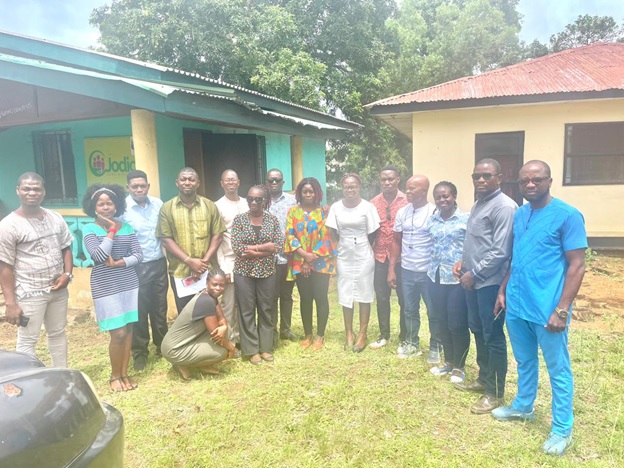MONROVIA – The Liberia Medicines and Health Products Regulatory Authority (LMHRA) recently concluded two rounds of risk-based post-marketing surveillance (RB-PMS) that included sample collection and testing of antimalarial and maternal, newborn, and children’s health (MNCH) medicines from the supply chain in Liberia. The results, which followed a first round of testing in 2021, showed improvement in the safety and quality of drugs in these categories that are for sale to the public.
LMHRA conducted the surveillance with support from the Promoting of Quality of Medicines Plus program (PQM+), which the U.S. Agency for International Development (USAID) funds and U.S. Pharmacopeia (USP) leads.
RB-PMS channels a country’s limited resources toward medicines and locations that present the highest risks to patients, providing a snapshot of the challenges confronting the most vulnerable and at-risk areas. While the results are not nationally representative, the findings help officials shape policy to improve the medical products and pharmaceuticals landscape.
At an April meeting in Monrovia, the LMHRA released its report of the recent two rounds of RB-PMS, completed in 2022. The authority discussed the findings of sampling in six of Liberia’s 15 counties that are at the highest risk of exposure to substandard and falsified (SF) medicines.
The Government of Liberia’s plan to reduce maternal mortality cannot be achieved without quality-assured MNCH medicines and malaria control efforts will suffer without assurances of the effectiveness of drugs to treat that disease. Frequent post-marketing surveillance is essential to ensure the quality of both antimalarial and MNCH medicines.
While a Liberia law called the LMHRA Act requires registration of medicines that reach the market, its enforcement is insufficient and most medicines procured by the Government of Liberia and donor agencies, who are major importers of medicines in the country, do not go through the full registration process. This creates a challenge for the LMHRA in distinguishing antimalarials procured through official channels by the Government of Liberia and donors from other unregistered medicines.
The results of the 2022 RB-PMS rounds have amplified a call for more rigorous enforcement of the registration laws.
The findings also prompted LMHRA to remove substandard or unregistered antimalarial and MNCH medicines worth more than $56,000 USD from circulation in the country. The medicines included artemether-lumefantrine, artemether injections, and oxytocin.
Registration of products is a key source of revenue that enables the LMHRA to fulfill its regulatory mandate. Failure to register products thus contributes to resource constraints for the authority.
During the first round of RB-PMS in 2021, LMHRA partnered with PQM+ and a technical working group (TWG) was established to oversee RB-PMS exercises. They collected 146 samples from six counties in that initial round. During round two, showing progress toward self-reliance, LMHRA required minimal support from PQM+ in collecting 202 samples from six counties: Lofa, Bong, Grand Gedeh, Margibi, Nimba, and Grand Bassa.
LMHRA’s Deputy Inspector-General, Dr. Thomas Kokulo, noted that the specific objective of the exercise was to detect the level of SF MNCH and antimalarial medicines in circulation at selected health facilities based on risk-level prioritization. He explained that the exercise would help determine the registration status of sampled antimalarial and MNCH medicines and provide data on the quality of sampled medicines.
Dr. Kokulo pointed out that the RB-PMS exercise was also intended to make informed recommendations to address identified issues of medicines quality and related supply chain problems.
Attendees at the results release meeting lauded the report and urged the LMHRA to ensure that suppliers adhere to requirements for proper storage of medications, especially antimalarials and MNCH medicines, to maintain the drugs’ potency. This will likely lead to even more improvement during the next round of RB-PMS.
LMHRA’s Managing Director, Pharmacist Keturah Smith-Chineh, closed the meeting noting that the authority, as the country’s regulatory arm, is responsible for ensuring that medical product storage follows LMHRA’s regulations.
She called on the Liberian Pharmacy Board, the Pharmaceutical Importers & Wholesalers Association of Liberia, and others in the sector to work with the LMHRA to conduct periodic inspections of medical warehouses in Liberia.
“We have a lot of warehouses across the country … that [are] not up to standard,” Dr. Smith-Chineh said, “and the LMHRA has started inspections on these facilities to ensure they meet regulatory standards.”







